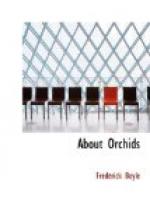Other great sales might be recalled, as that of Phaloenopsis Sanderiana and Vanda Sanderiana, when a sum as yet unparalleled was taken in the room; Cypripedium Spicerianum, Cyp. Curtisii, Loelia anceps alba. Rarely now are we thrilled by sensations like these. But 1891 brought two of the old-fashioned sort, the reappearance of Cattleya labiata autumnalis and the public sale of Dendrobium phaloenopsis Schroderianum. The former event deserves a special article, “The Lost Orchid;” but the latter also was most interesting. Messrs. Sander are the heroes of both. Dendrobium ph. Schroederianum was not quite a novelty. The authorities of Kew obtained two plants from an island in Australasia a good many years ago. They presented a piece to Mr. Lee of Leatherhead, and another to Baron Schroeder; when Mr. Lee’s grand collection was dispersed, the Baron bought his plant also, for L35, and thus possessed the only specimens in private hands. His name was given to the species.
Under these conditions, the man lucky and enterprising enough to secure a few cases of the Dendrobium might look for a grand return. It seemed likely that New Guinea would prove to be its chief habitat, and thither Mr. Micholitz was despatched. He found it without difficulty, and collected a great number of plants. But then troubles began. The vessel which took them aboard caught fire in port, and poor Micholitz escaped with bare life. He telegraphed the disastrous news, “Ship burnt! What do?” “Go back,” replied his employer. “Too late. Rainy season,” was the answer. “Go back!” Mr. Sander repeated. Back he went.
This was in Dutch territory. “Well,” writes Mr. Micholitz, “there is no doubt these are the meanest people on earth. On my telling them that it was very mean to demand anything from a shipwrecked man, they gave me thirty per cent. deduction on my passage”—201 dollars instead of 280 dollars. However, he reached New Guinea once more and tried fresh ground, having exhausted the former field. Again he found the Dendrobiums, of better quality and in greater number than before. But they were growing among bones and skeletons, in the graveyard of the natives. Those people lay their dead in a slight coffin, which they place upon the rocks just above high tide, a situation which the Dendrobes love. Mr. Micholitz required all his tact and all his most attractive presents before he could persuade the Papuans to let him even approach. But brass wire proved irresistible. They not only suffered him to disturb the bones of their ancestors, but even helped him to stow the plunder. One condition they made: that a favourite idol should be packed therewith; this admitted, they performed a war dance round the cases, and assisted in transporting them. All went well this time, and in due course the tables were loaded with thousands of a plant which, before the consignment was announced, had been the special glory of a collection which is among the richest of the universe.




